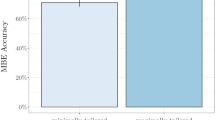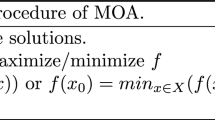Abstract
Since the 1960s, automated approaches to examination timetabling have been explored and a wide variety of approaches have been investigated and developed. In this paper we build upon a recently presented, sequential solution improvement technique which searches efficiently over a very large set of “adjacent” (neighbourhood) solutions. This solution search methodology, originally developed by Ahuja and Orlin, has been applied successfully in the past to a number of difficult combinatorial optimisation problems. It is based on an improvement graph representation of solution adjacency and identifies improvement moves by finding cycle exchange operations using a modified shortest path label-correcting algorithm. We have drawn upon Ahuja–Orlin’s basic methodology to develop an effective automated exam timetabling technique. We have evaluated our approach against the latest methodologies in the literature on standard benchmark problems. We demonstrate that our approach produces some of the best known results on these problems.











Similar content being viewed by others
References
Ahuja RK, Magnanti LT, Orlin JB (1993) Network flows: theory, algorithms, and applications. ISBN 1000499012. Prentice Hall, Englewood Cliffs, pp 133–165
Ahuja RK, Orlin JB, Sharma D (2000) Very large scale neighbourhood search. Int Trans Oper Res 7:301–317
Ahuja RK, Orlin JB, Sharma D (2001) Multiexchange neighbourhood search algorithm for capacitated minimum spanning tree problem. Math Program 91:71–97
Ahuja RK, Ozlem E, Orlin JB, Abraham OP (2002) A survey of very large-scale neighborhood search techniques. Discrete Appl Math 123:75–102
Ahuja RK, Orlin JB, Sharma D (2003) A composite neighbourhood search algorithm for capacitated spanning tree problem. Oper Res Lett 31:185–194
Asmuni H, Burke EK, Garibaldi JM (2005) Fuzzy multiple ordering criteria for examination timetabling. In: Burke E, Trick M (eds) The practice and theory of automated timetabling V: selected papers from the 5th International Conference, lecture notes in computer science 3616. Springer, Berlin Heidelberg New York, pp 334–353
Ayob M, Kendall G (2003) A Monte Carlo hyper-heuristic to optimise component placement sequencing for multi head placement machine. In: Proceedings of the International Conference on Intelligent Technologies, InTech’03, Chiang Mai, pp 132–141
Balakrishnan N, Lucena A, Wong RT (1992) Scheduling examinations to reduce second order conflicts. Comput Oper Res 19:353–361
Bardadym VA (1996) Computer-aided school and university timetabling: the new wave. In: Burke E, Ross P (eds) The practice and theory of automated timetabling I: selected papers from the 1st International Conference Lecture Notes in Computer Science 1153. Springer, Berlin Heidelberg New York, pp 22–45
Boizumault P, DelonY, Peridy L (1996) Constraint logic programming for examination timetabling. J Log Program 29(2):217–233
Brelaz D (1979) New methods to color the vertices of a graph. Commun ACM 22(4):251–256
Burke EK, Ross P (eds) (1996) Practice and theory of automated timetabling I, vol 1153 of lecture notes in computer science. Springer, Berlin Heidelberg New York
Burke EK, Carter MW (eds) (1998) Practice and theory of automated timetabling II, vol 1408 of lecture notes in computer science. Springer, Berlin Heidelberg New York
Burke EK, Newall JP (1999) A multi-stage evolutionary algorithm for the timetable problem. IEEE Trans Evol Comput 3.1:63–74
Burke EK, Erben W (eds) (2001) Practice and theory of automated timetabling III, vol 2079 of lecture notes in computer science. Springer, Berlin Heidelberg New York
Burke EK, Petrovic S (2002) Recent research directions in automated timetabling. Eur J Oper Res 140:266–280
Burke EK, De Causmaecker P (eds) (2003) Practice and theory of automated timetabling IV, vol 2740 of lecture notes in computer science. Springer, Berlin Heidelberg New York
Burke EK, Newall JP (2003) Enhancing timetable solutions with local search methods. In: Burke E, De Causmaecker P (eds) The practice and theory of automated timetabling IV: selected papers from the 4th International Conference, lecture notes in computer science 2740. Springer, Berlin Heidelberg New York, pp 195–206
Burke EK, Newall JP (2004) Solving examination timetabling problems through adaptation of heuristic orderings. Ann Oper Res 129:107–134
Burke EK, Trick M (eds) (2005) Practice and theory of automated timetabling V, vol 3616 of lecture notes in computer science. Springer, Berlin Heidelberg New York
Burke EK, Newall JP, Weare RF (1996a) A memetic algorithm for university exam timetabling. In: Burke E, Ross P (eds) The practice and theory of automated timetabling I: selected papers from the 1st International Conference, lecture notes in computer science 1153. Springer, Berlin Heidelberg New York, pp 3–21
Burke EK, Elliman D, Ford PH, Weare D (1996b) Examination timetabling in British universities—a survey. In: Burke E, Ross P (eds) The practice and theory of automated timetabling I: selected papers from the 1st International Conference, lecture notes in computer science 1153. Springer, Berlin Heidelberg New York, pp 76–90
Burke EK, Jackson KS, Kingston JH, Weare RF (1997) Automated timetabling: the state of the art. Comput J 40(9):565–571
Burke EK, Newall JP, Weare RF (1998) Initialisation strategies and diversity in evolutionary timetabling. Evol Comput J 6.1:81–103 (special issue on Scheduling)
Burke EK, Petrovic S, Bykov Y (2000a) A multicriteria approach to examination timetabling. In: Burke E, Ross P (eds) The practice and theory of automated timetabling III: selected papers from the 3rd International Conference, lecture notes in computer science 2079. Springer, Berlin Heidelberg New York, pp 118–131
Burke EK, MacCarthy B, Petrovic S, Qu R (2000b) Structured cases in CBR—re-using and adapting cases for timetabling problems. Knowl Based Syst 13(2–3):159–165
Burke EK, Kendall G, Soubiega E (2003a) A Tabu-search hyper-heuristic for timetabling and rostering. J Heuristics 9:451–470
Burke EK, Hart E, Kendall G, Newall JP, Ross P, Schulenburg S (2003b) Hyper-heuristics: an emerging direction in modern search technology. In: Glover F, Kochenberger G (eds) Handbook of meta-heuristics. Kluwer, Norwell, pp 457–474
Burke EK, Kingston J, de Werra D (2004a) Applications to timetabling. In: Gross J, Yellen J (eds) Handbook of graph theory. Chapman Hall/CRC Press, pp 445–474
Burke EK, Bykov Y, Newall JP, Petrovic S (2004b) A time-predefined local search approach to exam timetabling problem. IIE Trans 36(6):509–528
Burke EK, Petrovic S, Qu R (2006) Case based heuristic selection for timetabling problems. J Sched 36(6):509–528
Caramia M, Dell’Olmo P, Italiano GF (2001) New algorithms for examinations timetabling. In: Naher S, Wagner D (eds) Algorithm engineering 4th International Workshop, Proceedings WAE 2000 Saarbrucken, Germany, September. Lecture notes in computer science, vol 1982. Springer, Berlin Heidelberg New York, pp 230–241
Carter MW (1986) A survey of practical applications of examination timetabling. Oper Res 34:193–202
Carter MW, Laporte G (1996) Recent developments in practical examination timetabling. In: Burke E, Ross P (eds) The practice and theory of automated timetabling I: selected papers from the 1st International Conference lecture notes in computer science 1153. Springer, Berlin Heidelberg New York, pp 3–21
Carter MW, Johnson DG (2001) Extended partition initialization in examination timetabling. J Oper Res Soc 52:538–544
Carter MW, Laporte G, Lee SY (1996) Examination timetabling: algorithmic strategies and applications. J Oper Res Soc 47:373–383
Casey S, Thompson J (2003) GRASPing the examination scheduling problem. In: Burke E, De Causmaecker P (eds) The practice and theory of automated timetabling IV: selected papers from the 4th International Conference, lecture notes in computer science 2740. Springer, Berlin Heidelberg New York, pp 232–244
David P (1997) A constraint-based approach for examination timetabling using local repair techniques. In: Burke E, Carter M (eds) The practice and theory of automated timetabling II: selected papers from the 2nd International Conference, lecture notes in computer science 1408. Springer, Berlin Heidelberg New York, pp 169–186
de Werra D (1985) An introduction to timetabling. Eur J Oper Res 19:151–162
Di Gaspero L, Schaerf A (2001) Tabu search techniques for examination timetabling. In: Burke E, Erbens W (eds) The practice and theory of automated timetabling III: selected papers from the 3rd International Conference, lecture notes in computer science 2079. Springer, Berlin Heidelberg New York, pp 104–117
Fahrion R, Wrede M (1990) On a principle of chain exchange for vehicle routing problems (I-VRP). J Oper Res Soc 41:821–827
Gendreau M, Guertin F, Potvin JY, Seguin R (1998) Neighbourhood search heuristics for a dynamic vehicle dispatching problem with pick-ups and deliveries. CRT-98-10
Han L, Kendall G (2003a) Guided operators for a hyper-heuristic genetic algorithm. In: Gedeon TD, Chun Che Fung L (eds) Proceedings of AI-2003: advances in artificial intelligence. The 16th Australian Conference on Artificial Intelligence (AI’03), Perth, pp 807–820
Han L, Kendall G (2003b) Investigation of a tabu assisted hyper-heuristic genetic algorithm. In: Proceedings of Congress on Evolutionary Computation (CEC2003), vol 3, Canberra, Australia, pp 2230–2237, IEEE Catalog Number: 03TH8674, ISBN: 0-7803-7804-0
Joslin DE, Clements DP (1999) Squeaky wheel optimisation. J Artif Intell Res 10:353–373
Kendall G, Hussin MN (2004) An investigation of a tabu search based hyper-heuristic for examination timetabling. In: Kendall G, Burke E, Petrovic S (eds) Proceedings of the 1st Multidisciplinary International Conference on Scheduling: theory and applications (MISTA2003). Kluwer, Boston, pp 226–233
Merlot TGL, Boland N, Hughes DB, Stuckey JP (2003) A hybrid algorithm for the examination timetabling problem. In: Burke E, De Causmaecker P (eds) The practice and theory of automated timetabling IV: selected papers from the 4th International Conference, lecture notes in computer science 2740. Springer, Berlin Heidelberg New York, pp 207–231
Petrovic S, Bykov Y (2002) A multi-objective optimisation technique for exam timetabling based on trajectories. In: Burke E, De Causmaecker P (eds) The practice and theory of automated timetabling IV: selected papers from the 4th International Conference, lecture notes in computer science 2740. Springer, Berlin Heidelberg New York, pp 181–206
Petrovic S, Burke EK (2004) University timetabling. In: Leung J (ed) The handbook of scheduling: algorithms, models, and performance analysis. Chapman Hall/CRC Press, Boca Raton
Romero BP (1982) Examination scheduling in a large engineering school: a computer assisted participative procedure. Interfaces 12:17–23
Ross P, Hart E, Corne D (1997) Some observations about GA-based exam timetabling. In: Burke E, Carter M (eds) The practice and theory of automated timetabling II: selected papers from the 2nd International Conference, lecture notes in computer science 1408. Springer, Berlin Heidelberg New York, pp 115–129
Schaerf A (1999) A survey of automated timetabling. Artif Intell Rev 13(2):87–127
Terashima-Marín H, Ross P, Valenzuela-Rendón M (1999) Evolution of constraint satisfaction strategies in examination timetabling. Proceedings of the Genetic and Evolutionary Conference, Orlando, pp 635–642
Thompsom PM, Orlin JB (1989) The theory of cyclic transfer. Working paper OR200-89, Operation Research Center, MIT, Cambridge
Thompsom PM, Psaraftis HN (1993) Cyclic transfer algorithm for multi-vehicle routing and scheduling problems. Oper Res 41:935–946
Thompson JM, Dowsland KA (1998) A robust simulated annealing based examination timetabling system. Comput Oper Res 25:637–648
White MG, Chan PW (1979) Towards the construction of optimal examination timetables. Infor 17:219–229
White MG, Xie SB (2000) Examination timetables and tabu search with longer-term memory. In: Burke E, Erbens W (eds) The practice and theory of automated timetabling III: selected papers from the 3rd International Conference, lecture notes in computer science 2079. Springer, Berlin Heidelberg New York, pp 85–103
Acknowledgements
This work was supported by the Public Services Department of Malaysia and the University Kebangsaan Malaysia. Professor Dror’s contribution was funded by an Engineering and Physical Sciences Research Council Visiting Fellowship (GR/S071241/01). We are very grateful for this support. We are also very grateful to the anonymous referees whose thoughtful and considered comments significantly improved the paper.
Author information
Authors and Affiliations
Corresponding author
Rights and permissions
About this article
Cite this article
Abdullah, S., Ahmadi, S., Burke, E.K. et al. Investigating Ahuja–Orlin’s large neighbourhood search approach for examination timetabling. OR Spectrum 29, 351–372 (2007). https://doi.org/10.1007/s00291-006-0034-7
Published:
Issue Date:
DOI: https://doi.org/10.1007/s00291-006-0034-7




